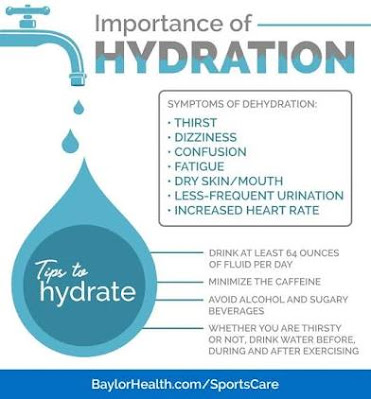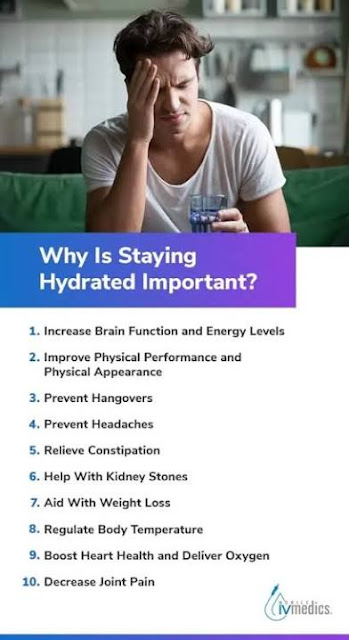The Importance of Hydration: Why Water is Essential for Your Health
Water is the essence of life. Every cell, tissue, and organ in the human body relies on proper hydration to function optimally. Despite its critical role, many people underestimate the importance of staying hydrated, often leading to dehydration, which can negatively impact physical performance, cognitive function, and overall well-being.
This article explores the vital role of hydration in maintaining health, the consequences of dehydration, and practical tips to ensure you stay adequately hydrated every day.
Why Hydration Matters
Water makes up about 60% of the human body, playing a crucial role in nearly every bodily function, including:
1. Regulating Body Temperature
Sweating is the body’s natural cooling mechanism. When dehydrated, the body struggles to regulate temperature, increasing the risk of heat exhaustion or heat stroke—especially during exercise or in hot climates.
2. Supporting Digestion and Nutrient Absorption
Water aids in breaking down food, dissolving nutrients, and transporting them to cells. It also prevents constipation by keeping the digestive tract lubricated.
3. Lubricating Joints and Protecting Tissues
Synovial fluid, which cushions joints, is primarily composed of water. Proper hydration helps maintain joint flexibility and reduces the risk of injuries.
4. Removing Waste and Toxins
The kidneys rely on water to filter waste from the blood and excrete it through urine. Dehydration can lead to kidney stones and urinary tract infections (UTIs).
5. Enhancing Cognitive Function
Even mild dehydration (as little as 1-2% loss of body water) can impair concentration, memory, and mood. Studies show that dehydration increases fatigue and reduces mental clarity.
6. Boosting Physical Performance
Athletes and active individuals lose fluids through sweat. Dehydration leads to muscle cramps, reduced endurance, and slower recovery times. Proper hydration improves strength, coordination, and stamina.
7. Maintaining Healthy Skin
Water keeps skin hydrated, reducing dryness and promoting elasticity. Chronic dehydration can accelerate skin aging and worsen conditions like eczema.
Signs of Dehydration
Many people don’t realize they’re dehydrated until symptoms become severe. Early signs include:
- Thirst
- Dry mouth and lips
- Dark yellow urine
- Fatigue or dizziness
- Headaches
- Reduced urine output
Severe dehydration can cause:
- Rapid heartbeat
- Confusion
- Fainting
- Low blood pressure
- Kidney failure (in extreme cases)
How Much Water Do You Need?
The "8x8 rule" (eight 8-ounce glasses per day) is a general guideline, but individual needs vary based on:
- Body weight – A common recommendation is 30-35 ml per kg of body weight (e.g., a 70 kg person needs ~2.1-2.5 liters daily).
- Activity level – Exercise increases fluid loss; drink extra before, during, and after workouts.
- Climate – Hot or humid weather increases sweating, requiring more hydration.
- Diet – Foods like fruits and vegetables (e.g., watermelon, cucumbers) contribute to fluid intake.
- Health conditions – Illness, fever, diarrhea, or pregnancy increase hydration needs.
Hydration for Athletes
Endurance athletes can lose 1-3 liters of sweat per hour. Sports drinks with electrolytes (sodium, potassium) help replenish lost minerals during prolonged exercise.
Tips for Staying Hydrated
1. Start Your Day with Water – Drink a glass upon waking to kickstart hydration.
2. Carry a Water Bottle – Keep one handy to sip throughout the day.
3. Set Reminders – Use apps or alarms to prompt regular water intake.
4. Eat Hydrating Foods – Include cucumbers, oranges, strawberries, and soups in your diet.
5. Monitor Urine Color – Pale yellow indicates proper hydration; dark yellow means you need more fluids.
6. Limit Dehydrating Drinks – Alcohol, coffee, and sugary sodas can increase fluid loss.
7. Hydrate Before Exercise – Drink 500 ml (17 oz) 2 hours before working out.
Myths About Hydration
❌ "Thirst is the Best Indicator" – By the time you feel thirsty, you may already be mildly dehydrated.
❌ "You Can’t Drink Too Much Water" – Overhydration (hyponatremia) dilutes sodium levels, which can be dangerous.
❌ "Coffee Dehydrates You" – While caffeine is a mild diuretic, moderate coffee intake still contributes to hydration.
Conclusion
Hydration is fundamental to health, affecting energy levels, brain function, digestion, and physical performance. By recognizing the signs of dehydration and adopting simple habits—like drinking water consistently and eating hydrating foods—you can maintain optimal health and well-being.
Make hydration a priority, and your body will thank you!
Stay hydrated, stay healthy!
#Water #hydration #health #nutrition




